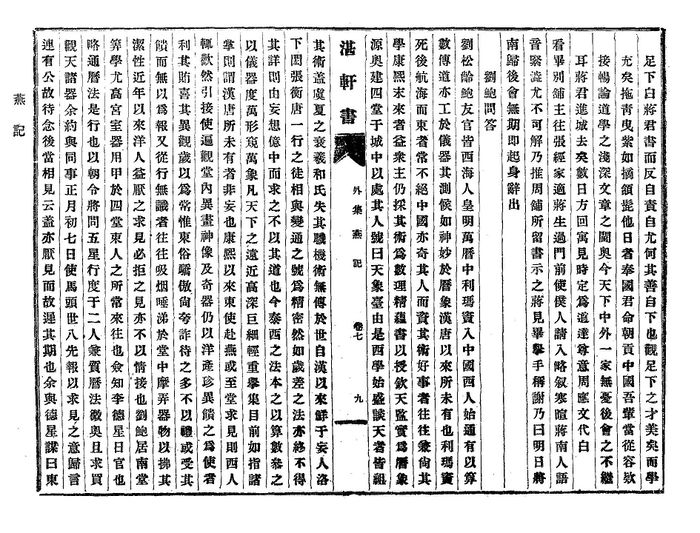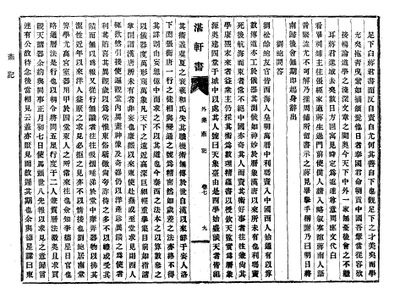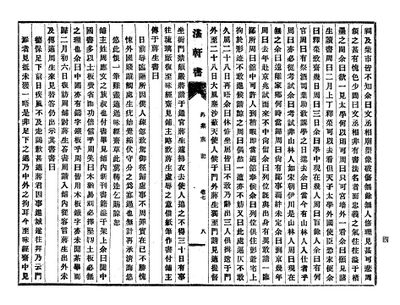"(Translation) 劉鮑問答"의 두 판 사이의 차이
2bthebridge (토론 | 기여) 잔글 (→Original Script) |
2bthebridge (토론 | 기여) |
||
| 17번째 줄: | 17번째 줄: | ||
=='''Introduction'''== | =='''Introduction'''== | ||
| − | "Yupo mundap" is a short script from Hong Daeyong (洪大容 MR:Hong Taeyong, 1731-1783)'s | + | "Yupo mundap [Questions and answers with Hallerstein and Gogeisl]" is a short script from Hong Daeyong (洪大容 MR:Hong Taeyong, 1731-1783)'s ''Record of an Embassy to Beijing'' 燕記 included in his anthology ''Damheonseo'' [MR: Tamhǒnsǒ 湛軒書]. It describes his encounter with two Jesuit missionaries, Ferdinand Augustin von Hallerstein (1703-1774 劉松齡) and Anton Gogeisl (date unknown 鮑友官), in the Southern Church in Beijing, which took place on the 9th day of the 1st month of 1766. It describes his observation on western architecture, paintings, the world map, astronomical devices, musical instruments and other products. <br /> |
| + | |||
| + | This travelogue is significant as it reveals the direct introduction of western learning to Joseon court through the channel established in Qing China. Hong mentioned the fact that his company Yi Deokseong (李德星 MR: Yi Tǒksǒng, date unknown) was ordered by the court to go visit these westerners, ask questions about the western calendar and to purchase astronomical devices. Such interest on Western Learning from Joseon court already appeared in the 13th year(1737) of King Yeongjo since the existing calendar did not match the reality.<ref>cf.http://sjw.history.go.kr/id/SJW-F13040040-04300 </ref> Nonetheless, there were still objections to adopting Chinese books influenced by Western Learning with much disregard to it.<ref>http://sjw.history.go.kr/id/SJW-F42040200-01500</ref> Eventually in the 15th year(1791), 30 years after Hong's visit to Beijing, those books were officially adopted by the court by the command of King Jeongjo to be used as textbooks for civil examinations.<ref>http://sillok.history.go.kr/id/kva_11510027_003</ref><br /> | ||
| + | |||
| + | Another importance is that we can see Hong's departure from sinocentrism supported by his admiration to the precise western astronomy, calendar and meteorology. He found these knowledge from the West fulfilling the lack of the existing calendric calculation from the Han and Tang which did not accurately solve the precession of equinoxes. In addition, his criticism on other Koreans who behaved inappropriately in the church with much disrepect to the missionaries depicts an interesting picture of Korean responses toward the West at that time. <br /> | ||
| + | |||
| + | In this sense, this record shows Hong's practical attitude as a ''silhak'' scholar who actively advocated new learnings from Qing China, contrary to then existing notion of revering Ming and rejecting Qing 崇明排淸. He voluntarily joined the group of envoys to Beijing to confirm his knowledge on the Western Learning by personally observing new books, stores, customs and famous sites influenced by westerners. The fact that he made personal interpretations and comments without relying on classical allusion also reveals his practical character. | ||
=='''Original Script'''== | =='''Original Script'''== | ||
2018년 7월 19일 (목) 10:52 판
| Primary Source | ||
|---|---|---|
 |
Title | |
| English | ||
| Chinese | 劉鮑問答 | |
| Korean(RR) | 유포문답 | |
| Text Details | ||
| Genre | ||
| Type | ||
| Author(s) | 洪大容 | |
| Year | ||
| Source | ||
| Key Concepts | ||
| Translation Info | ||
| Translator(s) | Participants of 2018 Summer Hanmun Workshop (Advanced Translation Group) | |
| Editor(s) | Goeun Lee | |
| Year | 2018 | |
Introduction
"Yupo mundap [Questions and answers with Hallerstein and Gogeisl]" is a short script from Hong Daeyong (洪大容 MR:Hong Taeyong, 1731-1783)'s Record of an Embassy to Beijing 燕記 included in his anthology Damheonseo [MR: Tamhǒnsǒ 湛軒書]. It describes his encounter with two Jesuit missionaries, Ferdinand Augustin von Hallerstein (1703-1774 劉松齡) and Anton Gogeisl (date unknown 鮑友官), in the Southern Church in Beijing, which took place on the 9th day of the 1st month of 1766. It describes his observation on western architecture, paintings, the world map, astronomical devices, musical instruments and other products.
This travelogue is significant as it reveals the direct introduction of western learning to Joseon court through the channel established in Qing China. Hong mentioned the fact that his company Yi Deokseong (李德星 MR: Yi Tǒksǒng, date unknown) was ordered by the court to go visit these westerners, ask questions about the western calendar and to purchase astronomical devices. Such interest on Western Learning from Joseon court already appeared in the 13th year(1737) of King Yeongjo since the existing calendar did not match the reality.[1] Nonetheless, there were still objections to adopting Chinese books influenced by Western Learning with much disregard to it.[2] Eventually in the 15th year(1791), 30 years after Hong's visit to Beijing, those books were officially adopted by the court by the command of King Jeongjo to be used as textbooks for civil examinations.[3]
Another importance is that we can see Hong's departure from sinocentrism supported by his admiration to the precise western astronomy, calendar and meteorology. He found these knowledge from the West fulfilling the lack of the existing calendric calculation from the Han and Tang which did not accurately solve the precession of equinoxes. In addition, his criticism on other Koreans who behaved inappropriately in the church with much disrepect to the missionaries depicts an interesting picture of Korean responses toward the West at that time.
In this sense, this record shows Hong's practical attitude as a silhak scholar who actively advocated new learnings from Qing China, contrary to then existing notion of revering Ming and rejecting Qing 崇明排淸. He voluntarily joined the group of envoys to Beijing to confirm his knowledge on the Western Learning by personally observing new books, stores, customs and famous sites influenced by westerners. The fact that he made personal interpretations and comments without relying on classical allusion also reveals his practical character.
Original Script
- Discussion Questions:
Q1. What was the impact of Hong's record to Joseon society? Did it make any change in Joseon court's attitude toward western learning?
Q2. Hong's perception on the West - how is it different from that of Yi Sugwang?

